|
|
|
Sort Order |
|
|
|
Items / Page
|
|
|
|
|
|
|
| Srl | Item |
| 1 |
ID:
176035
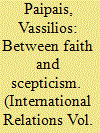

|
|
|
|
|
| Summary/Abstract |
In this essay, I offer a brief assessment of Nicholas Rengger’s engagement with arguments arising from the theological critique of modern politics and of his take on the relationship between faith and philosophy in modernity. Rengger’s scepticism, a peculiar mix of naturalism and philosophical idealism, combining insights from Oakeshott, Santayana and Augustine, did not cordon off faith but sought to work out its tensive relationship with practical forms of reasoning in modernity, a condition he described as a ‘hybrid’. Rengger’s critique of the hybridity of modernity rests on assumptions that expose some of the unresolved tensions of his anti-Pelagian scepticism.
|
|
|
|
|
|
|
|
|
|
|
|
|
|
|
|
| 2 |
ID:
176029
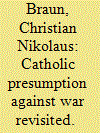

|
|
|
|
|
| Summary/Abstract |
One of the most contested arguments in contemporary just war thinking has been the question of the right starting point of analysis. On one side of the argument, one finds Catholic Church officials who argue for a ‘presumption against war’ as jumping-off point. On the other, one encounters critics of that position, led by James Turner Johnson, who defend a ‘presumption against injustice’ as the correct point of entry. Interestingly, both sides refer to St Thomas Aquinas, the key figure in the systematisation of the classical just war, as giving support to their respective position. While Johnson was vindicated as far as Aquinas’s historical starting point is concerned, debate about the contemporary purchase of the presumption against war has continued until the present day. Historical just war thinkers like Johnson have criticised the Church not only for turning the logic of the just war tradition on its head by reversing the inherited hierarchy between the so-called deontological and prudential criteria, but have also questioned the empirical evidence that has put the Church on this trajectory. In this article, I explain how the debate about the presumption against war continues to be relevant by engaging with the general direction the Catholic Church has taken up until Pope Francis and by investigating the particular example of its position on drone warfare. I point out that while the presumption against war runs counter to what Aquinas wrote during his days, Thomistic virtue ethics is generally open to development. The Church may thus claim a Thomistic patrimony in advocating for a presumption against war, but, as I demonstrate, the just war thinking that results, often referred to as modern-war pacifism, struggles to address important moral issues raised by contemporary warfare.
|
|
|
|
|
|
|
|
|
|
|
|
|
|
|
|
| 3 |
ID:
176025
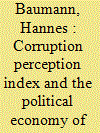

|
|
|
|
|
| Summary/Abstract |
The corruption perception index (CPI) compiled by Transparency International (TI) ranks countries by perceived levels of corruption. It is a reformist rather than a radical form of ‘statactivism’. First, I use Rose and Miller’s analytical framework to explain how corporate concerns come to dominate the CPI: How a neoliberal rationality is translated into a programme to govern corruption and then a technology – the CPI. A comprehensive survey of sources used to compile the CPI 2001–2016 shows that the vast majority were either produced for sale to corporate clients or were based on surveys of business elites. Second, I embed the index’s production into a wider political economy: TI workers are Gramscian intellectuals who put forward an interpretation of corruption that is non-threatening to corporate capital. This Gramscian framework holds wider relevance for analyses of the politics of global benchmarking.
|
|
|
|
|
|
|
|
|
|
|
|
|
|
|
|
| 4 |
ID:
176030
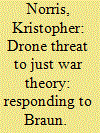

|
|
|
|
|
| Summary/Abstract |
In this response to Christian Braun’s article in this journal, I argue that the rise of drone warfare against terrorism suggests the necessity of the presumption against war (not its limit) and use the issue to advance this broader debate within just war theory at a pivotal moment in the tradition.
|
|
|
|
|
|
|
|
|
|
|
|
|
|
|
|
| 5 |
ID:
176031
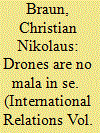

|
|
|
|
|
| Summary/Abstract |
This short essay responds to Kristopher Norris’s reply to my article entitled ‘The Catholic Presumption against War Revisited’. It engages with Norris’s three main points of critique.
|
|
|
|
|
|
|
|
|
|
|
|
|
|
|
|
| 6 |
ID:
176032
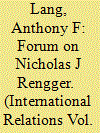

|
|
|
|
|
| Summary/Abstract |
This piece introduces the Forum on Nicholas J Rengger by focusing on Rengger’s humanist approach to the study of International Relations. It reviews his understanding of theory, tradition, order and war. It locates the contributors’ work in relation to these themes.
|
|
|
|
|
|
|
|
|
|
|
|
|
|
|
|
| 7 |
ID:
176033
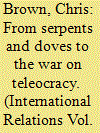

|
|
|
|
|
| Summary/Abstract |
In one of his earliest papers, ‘Serpents and Doves in Classical International Theory’ (1988), Nick Rengger set out themes that would be important to him for the next thirty years, including a Rortyan/Oakeshottian commitment to conversation as the appropriate mode of human inquiry, with the premise that there is no truth to be discovered, and a healthy scepticism directed towards reformist projects in international relations. These themes are present in his final works on just war and the anti-Pelagian imagination, but in a new, and less attractive, more dogmatic form. His critique of ‘teleocracy’ had hardened into something that no longer resembled a conversation, and his critique of progressivism involved the burning of a multitude of straw men. In 1988 Rengger aspired to be one of Rorty’s ‘edifying’ philosophers, by 2018 he seemed to have become committed to a system.
|
|
|
|
|
|
|
|
|
|
|
|
|
|
|
|
| 8 |
ID:
176026


|
|
|
|
|
| Summary/Abstract |
Literature of small state’s foreign policy-making has mostly focused on the structural factors and less on the perceptions of the weak state. This article adopts a cross-level analysis framed by role theory to investigate Vietnam’s China policy. Two role conceptions are provided to illustrate Vietnam’s management of bilateral relations with China. The main demarcation of these two roles lies in their perceptions of hierarchy embedded in the asymmetric relations. The independent role is ego-driven and identity based that it views hierarchy as mainly the discrepancy of material power. By contrast, the interactive role is relational oriented and interprets hierarchy from the angle of distribution of responsibilities; the higher role expectation of the other actor and the pursuit of relational security are especially emphasized by this interactive role. Finally, this article utilizes the case of South China Sea dispute to explain how and why inter-role conflict and domestic role contestation occurred.
|
|
|
|
|
|
|
|
|
|
|
|
|
|
|
|
| 9 |
ID:
176028


|
|
|
|
|
| Summary/Abstract |
This article argues that how the United Nations (UN) conceptualizes legitimacy is not only a matter of legalism or power politics. The UN’s conception of legitimacy also utilizes concepts, language and symbolism from the religious realm. Understanding the entanglement between political and religious concepts and the ways of their verbalization at the agential level sheds light on how legitimacy became to be acknowledged as an integral part of the UN and how it changes. At the constitutional level, the article examines phrases and ‘verbal symbols’, enshrined in the Charter of the ‘secular church’ UN. They evoke intrinsic legitimacy claims based on religious concepts and discourse such as hope and salvation. At the agential level, the article illustrates how the Secretary-General verbalizes those abstract constitutional principles of legitimacy. Religious language and symbolism in the constitutional framework and agential practice of the UN does not necessarily produce an exclusive form of legitimacy. This article shows, however, that legitimacy as nested in the UN’s constitutional setting cannot exist without religious templates because they remain a matter of a ‘cultural frame’.
|
|
|
|
|
|
|
|
|
|
|
|
|
|
|
|
| 10 |
ID:
176034
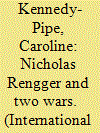

|
|
|
|
|
| Summary/Abstract |
Nicholas Rengger spent much of his career thinking and writing on the phenomenon of war. Eschewing any optimistic view that war could be abolished he also challenged the application of Just War theory to explain and justify the use of military force after the events of 9/11. His intellectual interactions with Jean Bethke Elshtain highlighted his growing unease with those in International Relations who sought to render palatable the use of torture, extraordinary rendition and technological ‘fixes’ in the pursuit of Western interests.
|
|
|
|
|
|
|
|
|
|
|
|
|
|
|
|
| 11 |
ID:
176024
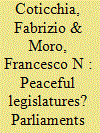

|
|
|
|
|
| Summary/Abstract |
The article contributes to the growing debate on parliamentary war powers and shows how parliaments matter in shaping both force deployment and force employment. Through original analysis of the Italian and German decision-making on military interventions after the Cold War, the article illustrates how formal and informal constraints shape the opportunity structures faced by executives that are willing to undertake military interventions. Revisiting, and building on, the great deal of research recently emerged on institutional constraints to the use of force, the article details the types of costs – namely, transaction and audience costs – linked to involvement of legislatives in the decision-making and provides empirical support for theories based on parliamentary war powers, adding new dimensions of analysis.
|
|
|
|
|
|
|
|
|
|
|
|
|
|
|
|
| 12 |
ID:
176027


|
|
|
|
|
| Summary/Abstract |
The endeavour to explain and predict international affairs is getting harder since it is ever more widely accepted that heterogeneous and fluid actors are making international politics. Positivists of various types have dominated the discussion on knowledge creation in the discipline of International Relations (IR), but the increasing acceptance of the dynamic character of international politics has led to the support and use of constructivist, post-Western or feminist approaches. There has also been an uptick in methodological discussions on these critical, non-positivist approaches. This article contributes to these debates by offering the first steps towards a cognitive frames–based methodology for IR. With a pragmatist ontology as its foundation, the approach re-sets the focus of analysis to the rationality of the international actors. The article, offers an initial description, by relying on illustrative examples, of the creation, the reach, durability and the organisational structure of cognitive frames in the global arena.
|
|
|
|
|
|
|
|
|
|
|
|
|
|
|
|
| 13 |
ID:
176036


|
|
|
|
|
| Summary/Abstract |
This article reflects on Nicholas J. Rengger’s 1997 article in International Affairs on ‘The ethics of trust in world politics’. The article has received comparably little attention, which is a shame because as I explore in my contribution it remains two decades on a highly important intervention in the on-going debate over the possibilities for developing and sustaining trust in an anarchic international system. Rengger argued that international cooperation, and the idea of international society it rests on, cannot be sustained in the absence of what he called ‘a presumption of trust’. However, he viewed this presumption in late modernity as an increasingly fragile one, and whilst he offered some ways to shore up the crumbling foundation of trust, his moral skepticism as to the possibilities of realising this run through his thinking. Rengger’s concern was that as the practices that ‘ground’ trust erode, cooperation will come to depend solely on rational egoist, interest-based calculations, and that such a basis is unstable and prone to breakdown. The problem that Rengger identified of how to ground authoritative practices of trust in international society remains an urgent one at a time when great power relations are characterised by increasing distrust. Having engaged with some of his key arguments in the article, I end by briefly identifying three problems that his essay would have benefited from considering further. These are (1) the relationship between trust and trustworthiness; (2) the neglect of security community theory; and (3) the potential of ‘godparenting’ (a concept Rengger borrows and develops from the moral philosopher Annette Baier) in international relations.
|
|
|
|
|
|
|
|
|
|
|
|
|
|
|
|
| 14 |
ID:
176023
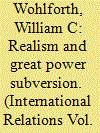

|
|
|
|
|
| Summary/Abstract |
I present a realist theory of subversion among great powers, an understudied phenomenon in the burgeoning literature on subversive statecraft. I show that a simple, rational cost-benefit calculus accounts for comparatively low-levels of subversion among non-belligerent great powers, much higher levels among belligerent great powers, and more frequent, violent and larger-scale subversion against weaker targets. Brief case studies of mid-twentieth century subversion featuring the Soviet Union and the United States illustrate the theory and provide preliminary support. Theory and evidence show that the conditions that are conducive to highly consequential subversion among great powers are quite limited and reversible. This gives rise to skepticism concerning claims that today’s strategic environment has fundamentally transformed the nature of great power rivalry so as to accord a newly central place to subversion.
|
|
|
|
|
|
|
|
|
|
|
|
|
|
|
|
|
|
|
|
|